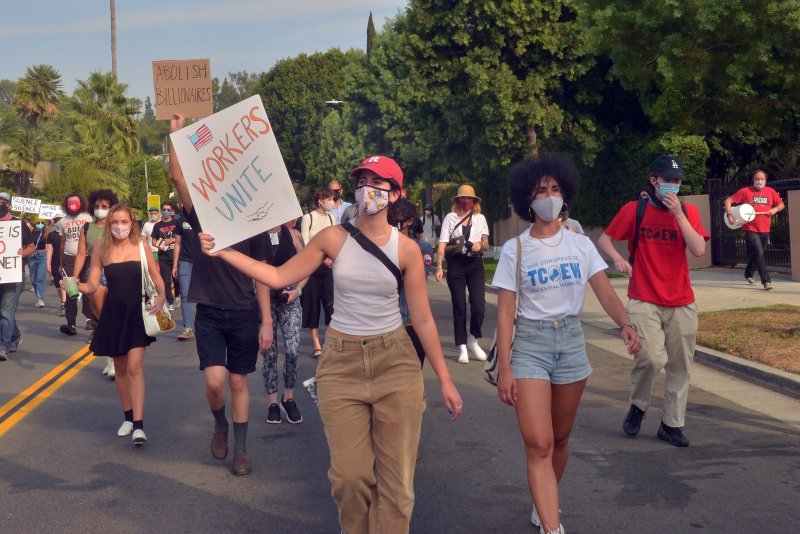1 of 6 | A coalition of labor and environmental activists rally at the gate of Amazon founder Jeff Bezos' Los Angeles-area mansion to protest the company's working conditions during the COVID-19 crisis on October 4. File Photo by Jim Ruymen/UPI |
License Photo
Sept. 28 (UPI) -- An independent branch of the federal government that enforces U.S. labor laws will review charges on Tuesday that online retail behemoth Amazon illegally retaliated against employees who'd spoken out against company policies by firing them.
The hearing before the National Labor Relations Board will examine claims by former workers Emily Cunningham and Maren Costa -- who were user experience designers at Amazon's Seattle headquarters -- who said they were fired last year because they were also outspoken critics of the company's climate policies and labor practices.
In April, a year after the workers were fired, the board determined that Amazon did illegally retaliate against them. It informed Cunningham and Costa that it would formally accuse the company of unfair labor practices on their behalf if Amazon did not settle the case.
The NLRB's regional office in May issued the complaint that will be heard on Tuesday.
Cunningham and Costa were leaders of the Amazon Employees for Climate Justice advocacy group, which pushed the company to limit its environmental impact. They also organized for 400 employees to intentionally violate Amazon's corporate communications policy after the company threatened to fire them for criticizing its climate policies.
After the COVID-19 pandemic began, Cunningham and Costa also shared petitions from warehouse workers that called for greater workplace protections.
"[We] were fired on Good Friday by Amazon for fighting for our colleagues' safety in the time of COVID," Costa tweeted in April after the board's initial decision.
In their initial complaint to the NLRB, Cunningham and Costa said Amazon had violated federal labor laws by terminating them, "based on discriminatory enforcement" of the company's non-solicitation and communication policies.
![]()
A coalition of labor and environmental activists rally at the gate of Amazon founder
Jeff Bezos' Los Angeles-area mansion to protest the company's working conditions during the COVID-19 crisis on October 4, 2020. File Photo by Jim Ruymen/UPI
The communication policy bars Amazon employees from speaking about company business without manager approval. Cunningham and Costa argued that both policies created a chilling effect that prevented employees from engaging in activities protected by federal labor laws.
Then-Sen. Kamala Harris, D-Calif., and Sen. Elizabeth Warren, D-Mass., later wrote a letter to Amazon expressing concern over Cunningham's and Costa's dismissals -- as well as the resignation of Tim Bray, who was a former vice president of Amazon's cloud computing group, who quit in protest.
Upon his resignation, Bray said that "firing whistleblowers" is proof of "a vein of toxicity running through the company culture."
"I choose neither to serve nor drink that poison," he added in a statement.
Amazon recently settled with a pair of warehouse workers over labor disputes, but not Cunningham and Costa.
The company agreed to a settlement with Johnathan Bailey, who was interrogated after leading a walkout at a warehouse in New York -- and reached a separate deal with Courtney Bowden, who said she was wrongfully terminated after advocating for sick pay for part-time workers.
Amazon has said that both Cunningham and Costa were fired for "repeatedly violating internal policies."
"We support every employee's rights to criticize their employer's working conditions, but that does not come with blanket immunity against any and all internal policies," Amazon spokesman Jose Negrete told CNBC earlier this month.
"We terminated these employees not for speaking about working conditions or safety, but for repeatedly violating internal policies."
Cunningham, Costa and the AECJ, however, argue otherwise.
"The NLRB case against Amazon is significant because it is the first case of corporate tech workers challenging Amazon for retaliating against organizing in the workplace," the AECJ said in a statement.
"After the firings, hundreds of tech workers at AECJ have spoken out repeatedly about how Amazon's warehouse pollution is disproportionately concentrated in communities of color, resulting in elevated rates of respiratory and cardiovascular disease in those communities."
















